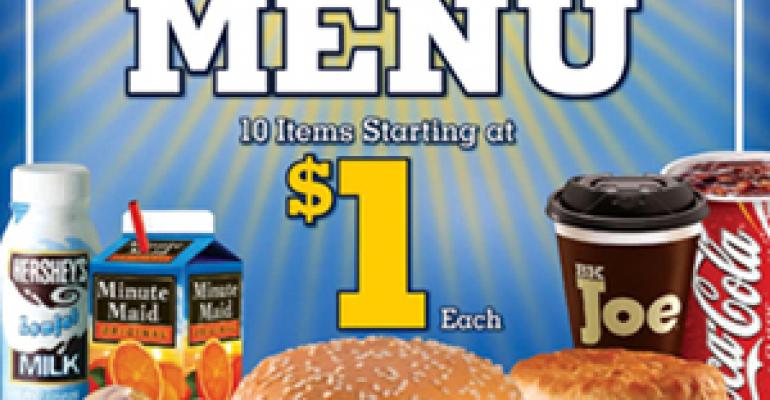With breakfast currently reigning as the biggest daypart opportunity for increasing same-store sales in the quick-service segment, Subway is joining with other competitors in bids to take bites out of the 40-percent share of the morning market held by McDonald’s.
Subway’s new toasted omelet sandwich is to be rolled out this month to the nearly 7,000 branches of the chain that already serve breakfast sandwiches.
Other recent developments in the escalating QSR breakfast battle include Burger King’s value menu rollout; Taco Bell’s and Wendy’s expanded breakfast testing; Dunkin’ Donut’s heightened focus on all-day breakfast sandwiches, which generated 10.7 percent of sales last year; and Starbucks Coffee’s expansion to more markets of breakfast sandwiches, which the chain sells throughout the business day.
Meanwhile, the chain that built the Egg McMuffin into the world’s best-known portable breakfast sandwich is showing vulnerability to that rising tide of competition, according to Bob Sandelman, president of Sandelman & Associates, a San Clemente, Calif.-based foodservice research firm that specializes in tracking consumer traffic. “That’s one reason why we are seeing so much activity in that category, [with] everyone from burger chains to Starbucks trying to get a piece of the action,’” Sandelman said.
As McDonald’s continues testing kitchen systems it has said could lead to the extension of its breakfast offerings to all-day availability, the franchisor is telling operators to start “planning to implement the Breakfast Optimization procedures,” according to a memo obtained by Nation’s Restaurant News and attributed to Jan Fields, chief operating officer of McDonald’s USA. Implementing those procedures would involve buying and installing new equipment aimed at expanding capability, improving capacity and adding new products in the future.
“Breakfast is the next battleground for market share with 8- to 9-percent daypart growth and increased competition,” the memo said. “The sooner we can optimize our breakfast platform to meet today’s growth opportunities…and position The Entire System for future new breakfast products…the greater chance we have to ‘win’ a majority of those guest counts.”
Many McDonald’s franchisees are concerned that the new plan may be a precursor to future requirements that they make breakfast items available all day, according to Richard Adams, a San Diego-based consultant to McDonald’s franchisees and a former franchisee himself. Franchisees first became suspicious of McDonald’s long-term plans last September after chief executive Jim Skinner mentioned at a stock analysts’ conference that a new “flexible operating platform” would enable breakfast service all day, Adams said.
McDonald’s officials, who did not return phone calls seeking comment, previously had denied that definite plans were afoot to make breakfast available all day. The goal of Breakfast Optimization is merely to improve operations during that busy mealtime, they have said.
Matthew Paull, the company’s chief financial officer, told analysts last fall that breakfast is McDonald’s best-performing day-part, accounting for 25 percent of the chain’s meal occasions.
Researcher Sandelman said all-day breakfast has proved worthwhile for such chains as San Diego-based Jack in the Box, with increasing sales fueled by changing work habits in today’s electronic age that have many people working odd hours.
Former McDonald’s franchisee Adams predicted, however, that demand for breakfast all day would be small and not worth operational challenges that would risk slowing service times. “McDonald’s has twice the customer traffic as Jack in the Box. The menu is already way too complicated,” he claimed.
In an interview last fall with Nation’s Restaurant News, Burger King’s chief concept officer, Denny Post, said her company had no plans to offer breakfast all day. “We don’t see the demand,” she said.
Dunkin’ Donuts does 78 percent of its sales in the morning, according to Joe Scafido, the chain’s chief creative and innovation officer, who said he is convinced of the wisdom of offering breakfast sandwiches all day at the chain’s 5,200 domestic stores.
“Dunkin’ Donuts has always offered great-tasting breakfast options all day that are convenient, portable and prepared quickly, and these are key differentiators that will help us continue our success in the breakfast category,” he said.
Starbucks, which now offers an assortment of egg-based sandwiches on English muffins or bagels in a half-dozen major markets, keeps them on hand throughout the day and heats them to order. The Seattle-based coffeehouse chain recently said it also will offer the hot breakfast sandwiches at branches that have drive-thru windows.
Some Subway units that already offer egg sandwiches do so all day. “It’s a good fit at truck stops, college campuses, hospitals and elsewhere where there are customers all around the clock,” said spokesman Les Winograd. He expects breakfast sales to increase over time, but he divulged no data on past trends.
For the new omelet item, a pre-made round omelet will be folded in half and served on bread toasted in Subway stores’ toaster ovens.
Chains that offer breakfast sandwiches and other breakfast items have not admitted to experiencing any operational glitches. Some skeptical Wendy’s franchisees, though, have voiced concerns about the potential for cannibalization of their lunch sales, as well as increased labor and other costs when breakfast debuts in at least half of the chain’s outlets by mid-2008.
Jack in the Box frequently fills simultaneous orders for both burgers and breakfast items, which it always has offered on an all-day basis. Accomplishing that feat has posed no operational problems, according to Tammy Bailey, the chain’s divisional vice president of menu, marketing and promotions.
Beefing up breakfast is one way quick-service chains can build same-store sales relatively easily, in light of domestic market saturation that has slowed new unit growth, Sandelman observed.




